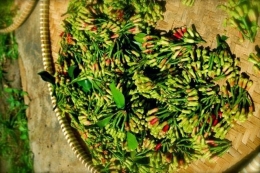by. DELFIANI DANGUT
Tuesday, 12 January, 2020|20:33. Entering the high season of clove harvest is what clove farmers or clove flower pickers await because the results are quite promising.
But unfortunately that hope was dashed in the midst of the Covid-19 pandemic in a bad economic situation, the price of goods soared, but the price of dry cloves dropped drastically, which normally can reach 85 thousand to 100 thousand now only 48 thousand to 50 thousand per kg, while cloves raw in Rp. 6,000 to Rp.7,000 per liter.
In the midst of the Covid-19 pandemic, the government and farmers expect the agricultural sector to keep moving and running well. The impact of the Covid-19 pandemic has caused a decline in a number of agricultural commodities.
Quoted from mediaperkebunan.id cigarette factories are only willing to buy cloves at a price of RP. 60,000 per kg. The reason is to adjust to world prices.
The decline in clove commodity prices was sharper in Mano, Poco Ranaka sub-district, East Manggrai Regency. Which Mano is known as a clove-producing area in the Manggarai region. In 2020 the price of cloves in Mano will reach Rp. 48,000 per kg to Rp. 53,000 per kg. Before the covid-19 outbreak, the price of cloves was able to penetrate the price of Rp. 90,000 per kg to Rp. 120,000 per kg.
One clove farmer in Mano, when met on (12/1/2020) stated that "the selling price of cloves can reach Rp. 48,000 per kg. This is what worries us. Not yet lag, we have to pay for workers who pick cloves. The tariff for workers is Rp.65.000 per day, when compared to the price of cloves, we feel a loss.
Farmers also lose money because the selling price does not match maintenance costs.
We hope there is a role for the government to stabilize the price of crops. Because the majority of Mano people are farmers and only depend on their income from cloves and coffee.
Farmers are quite worried that clove commodity prices will continue to decline and will cause losses because Covid-19 is not clear when it will end.
The government is expected to be able to intervene in this situation so that prices do not continue to decline, but can provide a little profit for farmers.







